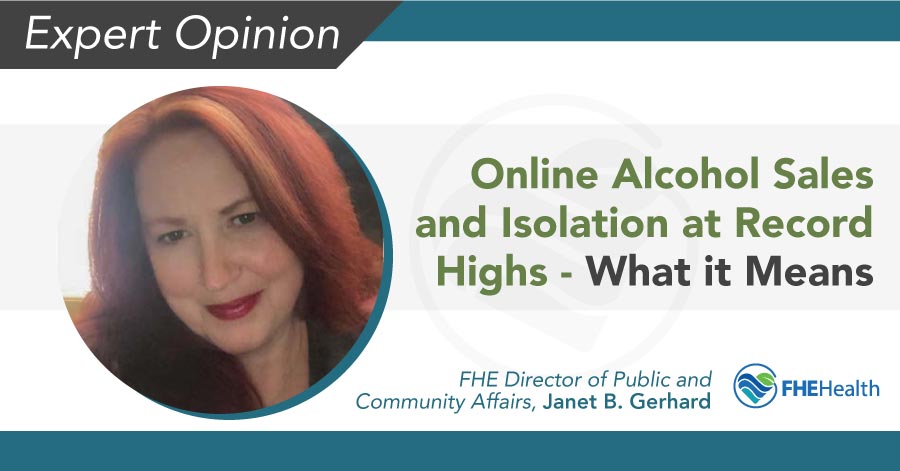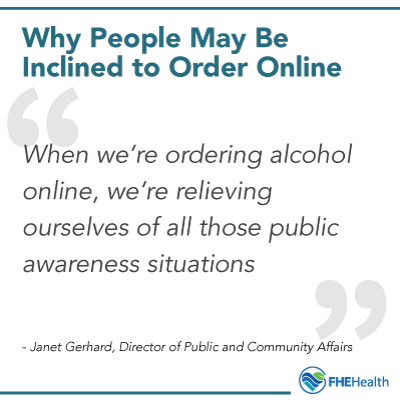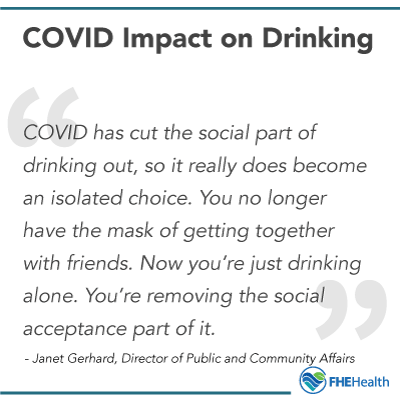
This article has been reviewed for accuracy by our peer review team which includes clinicians and medical professionals. Learn more about our peer review process.
Many things have changed in the U.S. since March 2020, when the first documented cases of coronavirus emerged. Two trends in particular may be directly related to rising rates of addiction and mental illness in this country: a dramatic increase in online sales of alcohol and what experts have referred to as the “second pandemic” of loneliness and social isolation.
For help exploring these two trends and their potential mental health impact, we consulted FHE Health Director of Public and Community Affairs Janet B. Gerhard. Gerhard regularly resources unions and their members with addiction and mental health treatment information. She therefore has insights and expertise into how online alcohol sales and social isolation seem to be affecting the health and habits of Americans nationwide.
The Explosive Growth of the Online Alcohol Market and Deliveries
 What does it mean to say that alcohol e-commerce and loneliness are trending upwards? Gerhard noted that the e-commerce market for alcohol grew 80 percent in 2020. She was citing a statistic from a report by ISWR Research, which appeared in a January 2021 article in Business Observer. Among sales of alcohol, the article said liquor experienced the biggest increase at 75 percent, followed closely by flavored wine (up by 73 percent).
What does it mean to say that alcohol e-commerce and loneliness are trending upwards? Gerhard noted that the e-commerce market for alcohol grew 80 percent in 2020. She was citing a statistic from a report by ISWR Research, which appeared in a January 2021 article in Business Observer. Among sales of alcohol, the article said liquor experienced the biggest increase at 75 percent, followed closely by flavored wine (up by 73 percent).
An earlier article in Forbes reported that just in the first three months of the pandemic alone, the e-commerce market experienced 10 years of growth. Alcohol sales fueled much of that growth.
Even more striking, Gerhard noted, was the fact that the U.S. is now the largest market for online liquor sales—bigger than even China.
Record Levels of Social Isolation
Meanwhile, the social distancing requirements instituted around the same time meant that the surge in online alcohol purchases could not be attributed to higher rates of partying in the U.S. On the contrary, experts began to talk about the growing health risks of social isolation, some invoking the term “double pandemic” to describe the joint problem of COVID-19 and loneliness. Just in the first month of the pandemic, the rate of loneliness increased by 20-30 percent, according to a survey by Social Pro.
How the Two Trends May Be Changing Drinking Habits
 How might the two trends be changing Americans’ drinking habits? “When we’re ordering alcohol online, we’re relieving ourselves of all those public awareness situations,” Gerhard said. She noted that drinking predominantly used to be in the context of cocktail hour or a party, where everyone was drinking and where drinking was not only socially acceptable but socially encouraged.
How might the two trends be changing Americans’ drinking habits? “When we’re ordering alcohol online, we’re relieving ourselves of all those public awareness situations,” Gerhard said. She noted that drinking predominantly used to be in the context of cocktail hour or a party, where everyone was drinking and where drinking was not only socially acceptable but socially encouraged.
“COVID has cut the social part of drinking out, so it really does become an isolated choice. You no longer have the mask of getting together with friends. Now you’re just drinking alone. You’re removing the social acceptance part of it.”
While drinking in the last year has become more of a solitary exercise, online alcohol deliveries have not totally eliminated the visibility of a drinking habit. Gerhard observed that whereas the liquor store was where you went to purchase alcohol, now “the alcohol is arriving to your doorstep in marked packages, clearly advertising the brand.” The visibility is still there, even if purchasing alcohol online might replace the risk of being recognized by one’s neighbor at the local liquor store.
How the Two Trends Are Related and May Be Fueling Alcoholism
The simultaneous increase in online alcohol sales and rates of social isolation may be fueling alcoholism and addiction. As illustration, Gerhard shared the following example of a fifth-grade, art teacher whom she had helped get into treatment for an alcohol problem:
She was working and parenting at home, had no more social life because of COVID and had an estranged partner—her isolation was insurmountable for her. She was a single mom, so she was teaching her fifth-grade class online while helping her own children do remote school at the same time. She told me that she was ordering alcohol online and wasn’t aware of how much she was actually consuming. Her alcohol habit started out as a “sip every hour” in her words. Pretty soon, she was drinking throughout the day.
Another concern: “Imagine you’re ordering alcohol and your kids get home first and it’s on the doorstep,” Gerhard shared. That access, especially “when alcohol is a normal situation in the house and is not forbidden,” can trigger alcohol use and a “downward spiral” in a young person.
How Signs of Alcoholism May Be Harder to Catch Because of Isolation
Before the pandemic, 28 percent of Americans reportedly lived alone. COVID only increased their isolation, even as it introduced even more Americans to the experience of living alone.
One potential consequence of this change may be that alcoholism may be harder to spot on the basis of physical symptoms alone, Gerhard said. She listed some of the telltale signs: “a bulbous stomach, rosacea, vascular signs (such as the veins in legs becoming pronounced), that ‘day-after’ smell and stale order.”
These “visual signs and symptoms” may be harder to notice when more Americans are living alone and are more isolated.
How to Spot an Alcohol Problem in the New Environment
Gerhard gave some suggestions for how to spot the signs of an alcohol problem in the new environment of greater social isolation coupled with surging online alcohol sales:
- Look at expenditures. “First look at your bank statement and identify how much revenue you’re putting in. The problem with online shopping is you often don’t realize how much you’re consuming.”
- Assess drinking patterns. “What time of day do you start drinking, and how many hours a day? It may often not be a reasonable time frame for the other things you have to do. If you’re up for 12 hours a day, and you’re drinking for 4 hours, it’s not a reasonable percent of time.”
- Ask whether alcohol is impacting other areas of life. “We also ask ourselves how we’re impacting other areas of our lives. Our relationships. Our professions. Is our family being impacted?”
- Get a professional assessment. “Reach out to be assessed. If you feel like there’s a problem, it may be worse than you think.
Gerhard added that “more often than not, when people finally call me it’s worse than they think.”
How New Trends Could Worsen Addiction and Mental Health Crisis
Are the new trends an addiction and mental health crisis in the making and a cause for alarm? Gerhard did not make any predictions—”I’m curious to see what will happen,” she said—but she raised concerns about the “accessibility of anything that is not well-legislated or regulated.”
“Alcohol is very acceptable as a social elixir,” she went on, “and we’re moving in a trend legislatively with cannabis that, in my view, is making alcohol use even more acceptable.
With state legislatures having a difficult time putting regulations in place on marijuana use, they’re forgetting the impact on alcohol use.”
In other words, in the absence of regulations, surging online alcohol sales could give rise to an even more extensive addiction and mental health crisis in this country—one only made worse by the loneliness pandemic.






